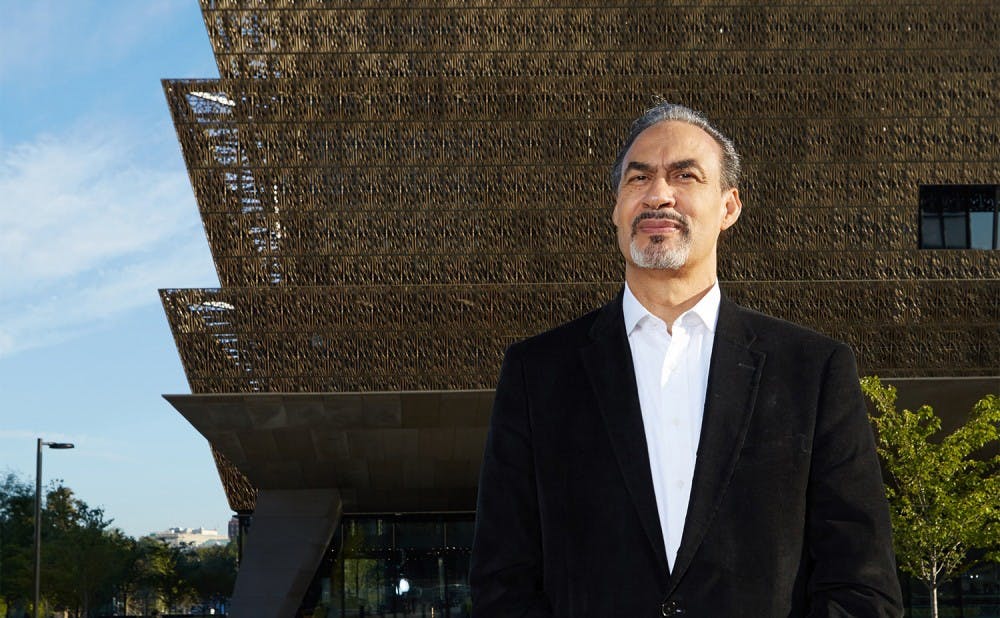A newly announced partnership between the Duke ALS Clinic and the Freelon Foundation will help expand the University's capacity to tackle the disease.
The initiative is centered around amyotrophic lateral sclerosis, a fatal condition characterized by a loss of motor control in patients and more commonly referred to as ALS. With the new financial backing, the DAC plans to establish an endowed professorship, fund future clinical trials and expand the number of patients who can visit the DAC, explained Dr. Richard Bedlack, associate professor of neurology and founder and director of the DAC.
Duke is partnering with the Freelon Foundation and the Design a World Without ALS campaign, both of which were created by Phil Freelon—leader of the design team for the Smithsonian National Museum of African American History and Culture—and his family to promote ALS research.
“The [Design a World] campaign's title is a call to action," said Freelon, who was diagnosed with ALS in March 2016, shortly before the new Smithsonian was revealed. "I speak for other designers and anyone in general who would like to see an end to this disease."
The campaign is under the umbrella of the Freelon Foundation and is working to raise an additional $250,000 for the Duke ALS Clinic, with plans to raise more in the future. On April 20, 2017, the campaign will culminate in an event at the Carolina Theater, when the proceeds will officially be given to the clinic.
"They say it's an incurable disease, but I would say it's an underfunded disease," Freelon said. "With the kind of resources that other causes have been able to garner—let's say heart disease or cancer—there's a lot more money flowing into that research."
Bedlack explained that the endowed professorship will eventually be valued at $2.5 million and will fund a faculty member who will focus exclusively on ALS research.
Currently, no Duke faculty members are dedicated solely to ALS research, with Bedlack noting that he spends about only 50 percent of his time studying the disease. He added that a committee will be used to determine who will receive the position.
“I hope it's me [the committee selects] because I'm very passionate about [ALS]," he said. "But if it's not, it’s still a win for the people in North Carolina because somebody would be focused full-time on ALS.”
ALS is a degenerative disease that affects motor neurons, which Bedlack described as wires that connect the decision-making part of the brain to a person’s muscles. Over time, he explained, people with ALS become paralyzed and eventually are unable to breathe.
“I have less and less mobility, less and less control of the voluntary muscles with me," Freelon said of his condition. "[My ALS symptoms] started in the legs. I've had to learn to walk with a cane, to be careful about falling and to learn how to accept help from other people.”
The disease first gained public awareness through the Ice Bucket Challenge, a viral trend in which individuals dumped buckets of frigid water on themselves and invited others to donate to the ALS Association, eventually raising more than $115 million.
Despite some advances in treating the severity of ALS symptoms, there is no cure for the disease, with patients surviving an average of two to five years after diagnosis, according to the ALS Association.
Since the disease affects very few individuals—about two per every 100,000 people—relatively little research has been conducted on its biological basis and treatment.
Duke was among the first hospitals in the country to establish a dedicated clinic for treating ALS symptoms in 2001, Bedlack said. At the facility, patients are seen by a social worker, a research nurse and an entire team of therapists who individually specialize in communication, swallowing, nutrition, breathing, arm functions and leg functions. Since the founding of the Duke clinic, Bedlack said he has noticed that patients who undergo treatment live longer than statistically anticipated.
Bedlack explained that his inspiration for starting the clinic came during the early 90s, when he saw his first patient with the disease.
"I remember being fascinated by this person’s story and neurological exam," he said. "Then, [I became] just absolutely amazed by how much we didn't know about ALS—why it happened and why people couldn't just shake it off like they did with a cold or a flu.”
Duke sponsors clinical trials for ALS, Bedlack said, explaining that trials are partially funded by pharmaceutical companies testing their ALS drugs.
In addition, the DAC hosts trials for alternative therapies, which are not well-funded and are even sometimes considered controversial, Bedlack noted.
Bedlack said that he was inspired to pursue alternative therapies after talking to some of his patients, many of whom would take to the Internet after learning of their diagnosis.
“I recognized early on that people would go home from our clinic and go on the Internet, and they would try things that they read about on the Internet," he said.
In response, Bedlack created the ALSUntangled program to scientifically examine some of these alternative therapies and determine their effectiveness. He noted that some patients diagnosed with ALS have improved their condition with alternative therapies and are referred to Bedlack's ALS Reversals program. Among the alternative therapies suggested are nutritional supplements and other non-drug solutions.
“I never knew those existed," Bedlack said. "They’re not in any textbook, and they were never taught to me, but I found some of these people on the Internet, and I have [patient] medical records, so I'm studying them. It's a very controversial type of research, but I really think there could be a clue here on how to make other people [with ALS] better.”
Get The Chronicle straight to your inbox
Signup for our weekly newsletter. Cancel at any time.

